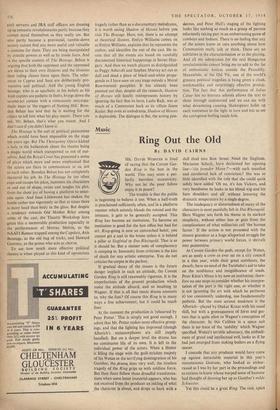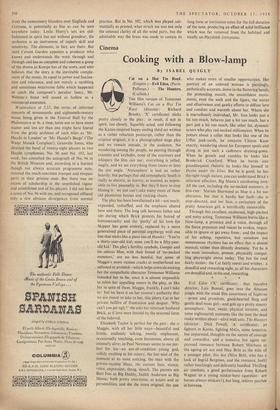Music
Ring Out the Old
By DAVID CAIRNS MR. DAVID WEBSTER is fond of saying that the Covent Gar- den Ring is the best in the world. This may seem a per- fectly harmless eccentricity. Why not let the poor fellow enjoy it in peace?
The trouble is that the public is beginning to believe it too. When a half-truth is proclaimed sufficiently often, and in a platform manner which astutely blends the rotund and the intimate, it gets to be generally accepted. This Ring has become an institution. To become an institution is good for the box office but bad for art. Ring-going is now an entrenched habit; you cannot get a seat in the house unless it is behind a pillar at Siegfried or Das Rheingold. That is as it should be. But a sinister note of complacency is creeping in. Immunity from criticism is the kiss of death for any artistic enterprise. You do not criticise the corpse in the parlour.
If gradual decay of the tissues is the future danger implicit in such an attitude, the Covent Garden Ring is still reasonably vigorous. It is the imperfections of the present production which make the attitude absurd, and so insulting to Wagner. If that is all that music drama amounts to, why the fuss? Of course this Ring is in many ways a fine achievement; but it could be much finer.
At the moment the production is 'rehearsed by Peter Potter.' This is simply not good enough. I admit that Mr. Potter makes some effective group- ings, and that the lighting has improved (though Alberich's metamorphoses are still ineptly handled). But on a deeper level the drama has no continuous life of its own. It is left to the individual power of the actors. When a Hotter is filling the stage with the guilt-stricken majesty of his Wotan or the terrifying disintegration of his Gunther, the drama does very well; the timeless tragedy of the Ring grips us with sublime force. But then there follow those dreadful transforma- tions when some lesser immortal appears, who has not received from the producer an inkling of what the character is about, and drops us back with a dull thud into Bow Street. Need the Sieglinde, Marianne Schech, have declaimed her opening line—`ein fremder Mann ?'—with such manifest and unrelieved lack of conviction? She was so little identified with the role that she could quite safely have added 'Oh no, it's Jon Vickers, and very handsome he looks in his blond wig and his bare shoulders and all' without lowering the dramatic temperature by a single degree.
The inadequacy or distortedness of many of the characters is most painfully felt in Das. Rheingold.
Here Wagner sets forth his theme in its starkest simplicity, without either loss or gain from the complications of what militarists call 'the human factor.' If the action is not presented with the utmost grandeur as a huge allegorical struggle for power between primary world forces, it shrivels into pantomime.
At Covent Garden the gods, except for Wotan, are as seedy a crew as ever sat on a city council in a thin year, while their great antitheses, the dwarfs, have no need of the Tarnhelm's aid to take on the semblance and insignificance of toads.
Peter Klein's Mime is by now an institution; there- fore no one stops to consider whether his interpre- tation of the part is the right one, or whether it is not (granting the art with which he performs it) too consistently underdog, too fundamentally pathetic. But the most serious weakness is the Alberich—played by Otakar Kraus with his usual skill, but with a grotesqueness of farm and ges- ture that is quite alien to Wagner's conception of the character. In this Caliban in a space suit there is no trace of the 'nobility' which Wagner specified. Wotan's terrible adversary, the embodi- ment of greed and intellectual evil, looks as if he had just emerged from stoking boilers on a flying saucer.
I concede that any producer would have come up against intractable material in this year's mountainous Gutrune, who looked as embar- rassed as I was by her part in the proceedings and as curious to know whose warped sense of humour had thought of dressing her up as Gunther's made Schwester. .
Yet this could be a great Ring. The cast, apart from the unnecessary blunders over Sieglinde and Gutrune, is potentially as fine as can be seen anywhere today; Leslie Hurry's sets are old- fashioned in spirit but not without grandeur; the orchestra is an instrument of superb skill and sensitivity. The elements, in fact, are there. But until Covent Garden appoints a producer who knows and understands the work through and through and has as complete and coherent a grasp of the drama as Kempe has of the score, and who believes that the story is the inevitable comple- ment of the music, its equal in power and fascina- tion and relevance, and not merely a rambling and sometimes wearisome fable which happened to catch the composer's peculiar fancy, Mr. Webster's boast will sound as hollow as a ministerial assurance.
Wednesdays at 5.55, the series of informal concerts of seventeenth- and eighteenth-century music being given in the Festival Hall by the Philomusica at 4s. a time, turns out to have more matter and less art than one might have feared from the grisly archness of such titles as 'Mr. Haydn in London' or 'Mr. Handel's Barge' (`The Water Musick Compleat'). Granville Jones, who directed the band of twenty-eight players in two Haydn symphonies, No. 96 and No. 102, last week, has consulted the autograph of No. 96 in the British Museum and, according to a learned though not always accurate programme note, restored the much-rewritten trumpet and timpani parts to their pristine state. But there was no excess of scholarship in the unpolished vigour and uninhibited zest of his players. I did not have a score of No. 96 with me, and recognised offhand only a few obvious divergences from normal practice. But in No. 102, which was played sub- stantially as printed, what struck me was not only the unusual clarity of all the wind parts, but the admirable way the brass was made to sustain its long forte or fortissimo notes for the full duration of the note, producing an effect of solid brilliance which was far removed from the habitual and totally un-Haydnish fortepiano.



































 Previous page
Previous page